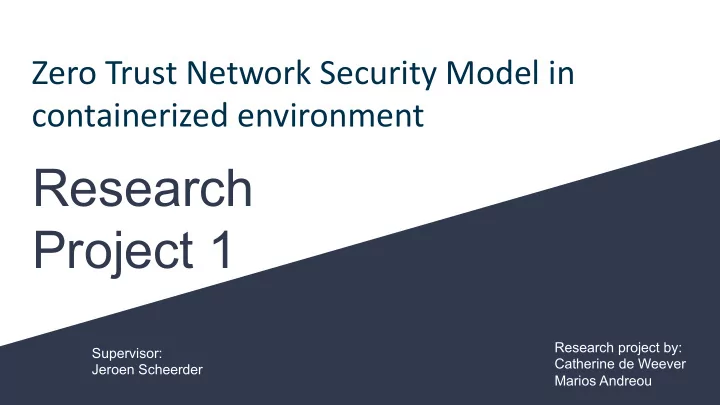

Zero Trust Network Security Model in containerized environment Research Project 1 Research project by: Supervisor: Catherine de Weever Jeroen Scheerder Marios Andreou
The Problem ● Deploy Container Images with Malicious Code. ● Deploy Benign Container Images and Download Malicious Payloads at Run Time. ● Deploy Malicious Payloads on the Host. ● Obtain Sensitive Information from the Docker Log. 2 (1)
Zero Trust ●Security Model ●Treat traffic, even inside as hostile ●Never trust, always verify ●Strategic approach 3
Research Question How to implement Zero Trust for "east/west" traffic between microservices in containerized environment? ●How to regulate the "east/west" traffic flow? ●How to implement confidentiality at transit data? 4
Methodology ●Get to know the current setup of ON2IT ●Find out what is missing ●Literature study to find solutions ●Implement a proof of concept for viability 5
Related Work ● Casimer DeCusatis et al. ○transport-level approach (first packet authentication ) ○ protection only on layer 3/4 ● Fatima Hussain et al. ○API gateway/proxy-based approach (secure API service mesh) ○Istio and Kubernetes ● Zirak Zaheer et al. ○microservice identities (eZtrust) ○extended Berkeley Packet Filter (eBPF) ○Proof of concept only for visibility 6
ON2IT current solution ●Zero Trust approach ●Containers are segmented using Istio (sidecar) ●Data encrypted in transit using Istio ●No deep traffic visibility 7
Background: Istio ●Micro-segmentation ○Envoy Sidecar proxy ●Encryption ○mutual TLS Sidecar proxy deployment 8
Background ●Cilium ○Berkeley Packet Filter (BPF) ○Security visibility and Enforcement ●Hubble ○Requires Cilium and extended Berkeley Packet Filter (eBPF) ○Deep visibility into the communication ○TCP connections, DNS queries, HTTP requests, etc. 9
Setup ● Google Cloud Platform ○ Google Kubernetes Engine ■ 1 cluster ■ 4 nodes ○ Cilium ■ Berkeley Packet Filter ○ Istio ■ Envoy Proxy ■ Built on top of Cilium ○ Hubble ■ Built on top of Istio 10
Demo Application ● A demo application deployed for the purpose of having a realistic environment. ● Monitor traffic between “Product Page” proxy and “Review v1” proxy. 11
Proof of Concept(1) ●Hubble enables deep visibility for the following metrics: ○DNS ○Drop ○TCP ○Port-Distribution ○ICMP ○HTTP 12
Proof of Concept(2) ●Encryption ●Micro-segmentation ○Reviews-v1 IP → 10.56.1.112 13
Discussion(1) Zero Trust Operational Controls present: ●Istio: ○SSL encryption for “east-west” and “north-south” traffic ○Centrally managed ○Micro-Segmentation ○RBAC Based Controls (deprecated) → Authorization Policy ○Restricted inbound and outbound access 14
Discussion(2) Zero Trust Operational Controls present: ●Cilium: ○Enhances network security rules/policies ●Hubble: ○Data classification ○Traffic-inspection ○Behavioral analytics 15
Conclusion(1) ●Regulate traffic: ○Micro-segmentation provided by Istio ○Traffic visibility provided by Hubble in combination with Cilium and eBPF ●Confidentiality at transit data: ○Encryption provided by Istio 16
Conclusion(2) How to implement Zero Trust for "east/west" traffic between microservices in containerized environment? Appropriate Zero Trust Controls: ●Encryption in Transit ●Centrally managed ●Micro-Segments ●Data classification ●Traffic-inspection ●Authorization Policies 17
Future Work ●Data leakage detection ( DLP controls) ●Content-Inspection of packets ●Behavioral analytics ●Automation ○Logging 18
Questions 19
References 1) https://www.theinquirer.net/inquirer/news/3074793/docker-hub-breach 1) https://unit42.paloaltonetworks.com/attackers-tactics-and-techniques-in-unsecured-docker-daemons- revealed/ 20
Recommend
More recommend